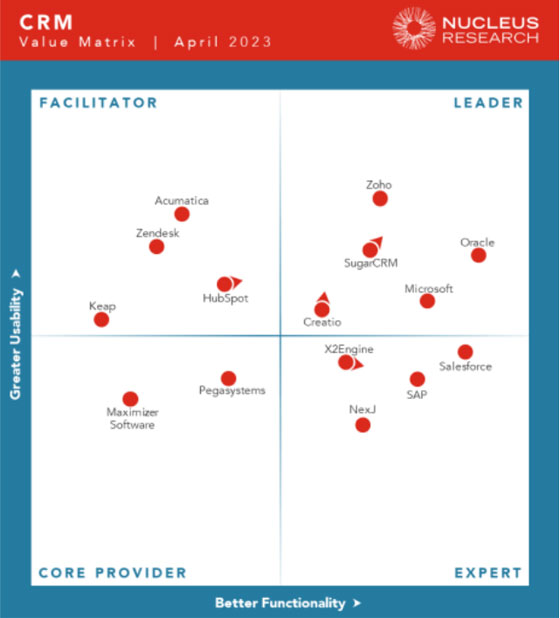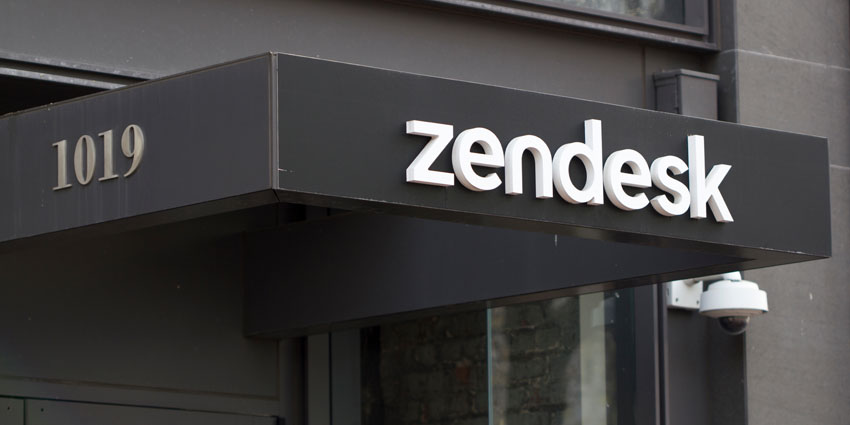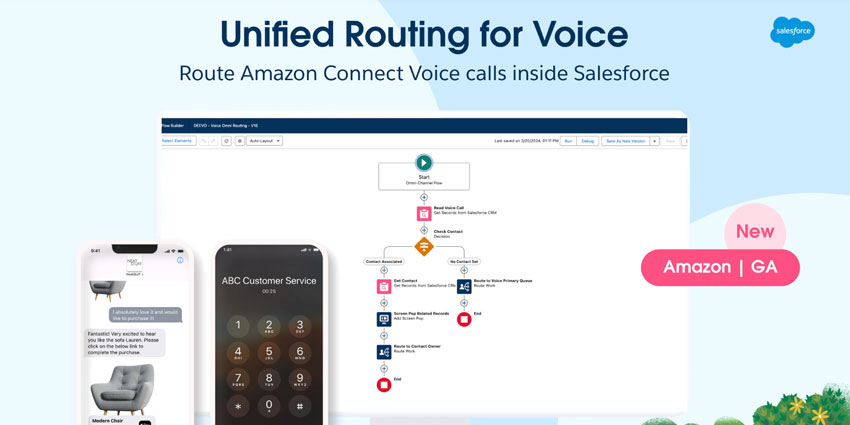With hundreds of vendors, the CRM market is ultra-competitive.
Salesforce is the most prominent provider, occupying 22.9 percent of the space – according to IDC.
Yet, there is a big gap between Salesforce and its rivals.
Indeed, Microsoft is its closest competitor, working with four times fewer CRM clients.
Such a statistic showcases just how competitive the battle for the remaining 77.9 percent of the market is – especially with sector-specific players now gaining ground in the space.
Nevertheless, many big names are hoping to create a chasing pack, innovate fast, and disrupt the status quo.
Prominent market analyst Nucleus Research has kept tabs on 14 of the chasing pack – in addition to Salesforce – evaluating them on the usability and functionality of their platforms.
In doing so as part of its “CRM Technology Value Matrix 2023”, Nucleus Research isolated its five leading offerings, with Salesforce missing the cut.

CRM Leaders
Leaders occupy the top-right quadrant of the chart above. In the assessment, these vendors performed above average in their usability and functionality. This year’s leaders include:
- Zoho
- Oracle
- Microsoft
- SugarCRM
- Creatio
Zoho
Zoho achieved the highest score for usability in this year’s report, with Nucleus praising the platform’s private cloud architecture, speedy deployment options, and unified data model. The latter enables more robust integrations and increased interoperability across the entire Zoho ecosystem, third-party applications, and custom services. Meanwhile, the platform’s out-of-box customizability, intuitive UI, and CRM Analytics mobile app are additional strengths. The analyst concludes by noting that Zoho is now a “feasible option for organizations of all sizes” – despite a long history of deployments in SMBs.
Oracle
Oracle leads the CRM space in its functionality, according to Nucleus. Its modular design is critical here, allowing the vendor to handle “all customer-facing processes” – from sales to service, eCommerce to marketing, data management to analytics. Moreover, it lays the foundations for value-add processes, including lead-to-cash and revenue management. Oracle also benefits from its expansive third-party and enterprise data network – with Nucleus noting how its customers often laud the vendor’s extensibility. The customer may also partner with Oracle on ERP, BI, supply chain, resource management, and more – with many embracing the full-suite approach.
Microsoft
Microsoft has pulled its CRM and ERP solutions closer, enabling a more holistic view of business performance and improved decision-making. These CRM applications cover marketing, sales, customer service, commerce, customer insights, and field service. By running AI and its market-leading BI solution – according to Gartner – across these, Microsoft strives to serve up real-time data to its clients. Businesses may harness these insights to enhance marketing campaigns and customer relationships. Now, the tech pioneer hopes to make it easier for non-technical users to build such a strategy to strengthen decision-making and manage digital commerce experiences – and Nucleus seemingly approves of such an approach.
SugarCRM
SugarCRM embeds data analytics and integration capabilities across its service, sales, and marketing CRM solutions suite. In doing so, the vendor successfully reduces roadblocks, bolsters usability, and offers a more holistic view of each customer, according to Nucleus. Moreover, with this integration-first approach, users can choose from over 240 extensions to complete industry-specific tasks. The analyst also applauds the flexibility of SugarCRM’s pricing, as businesses can choose from several subscription plans – alongside deployment models. Indeed, clients may select a cloud, on-premise, or hybrid solution.
Creatio
Creatio has gained market momentum with a single platform for process automation and data management. The combination aims to drive operational efficiency by streamlining business workflows. Moreover, the platform is highly customizable, with no-code capabilities that Nucleus lauds. These allow businesses to build a platform that meets their unique requirements more simply. Finally, Creatio impresses with its lead management features, customer journey analytics, and speed of innovation. The latter helped it to release additional composable CRM components, a new UI, and an updated no-code designer in the past 12 months alone.
CRM Facilitators
Facilitators sit in the bottom-right quadrant. In the study, these vendors performed above average in their usability but lagged leaders in functionality. This year’s facilitators include:
- Acumatica
- HubSpot
- Zendesk
- Keap
Acumatica
While it’s a more recognizable name in the ERP space, Acumatica brings its expertise in that arena to the CRM market. In doing so, the vendor has created a significant differentiator – as per the report. Indeed, it removes the need for disparate solutions, serves up a central interface, and offers a single database across business units. As such, everyone gains a unified view of customer experience, encouraging cross-function collaboration. Nucleus also lauds the accessibility of Acumatica’s platform – alongside its reporting and analytics tools, customer support portal, and machine learning. Finally, the analyst suggests that the vendor provides an attractive price point relative to industry standards.
HubSpot
HubSpot has built its CRM platform to support communications across the customer lifecycle, from lead generation to customer retention. The vendor pairs this framework with a commitment to customization, allowing businesses of all shapes and sizes to develop a solution that works for them. Indeed, it offers an extensive marketplace alongside optional tools that include advanced permissions, configure-price-quote functionalities, and mature reporting. Nucleus applauds this approach alongside its Operations Hub. The solution allows businesses to unify data, sync bidirectional data, and eliminate the need for third-party tools. Lastly, the analyst pinpoints a close connection with AWS Lamda as another strength for highly customizable task automation.
Zendesk
Leveraging its helpdesk expertise, Zendesk allows businesses to track the status of conversations across numerous customer engagement channels. In doing so, the vendor streamlines agent support tasks and mechanizes workflows with back-end automation. Such applications underline the value Zendesk delivers for service teams. Yet, other business units also advocate for Zendesk, with Nucleus noting its marketplace of 1,200 applications and pre-built integrations with various prominent enterprise technologies as a significant advantage. In addition, the analyst singles out its bot-building experience, intelligent routing, and messaging capabilities for further praise.
Keap
Keap innovates with a drive to increase ease of adoption for end-users. Perhaps this is most evident in its AI and automation tools, which less technically-proficient team members can harness to drive value. One such feature is its embedded analytics, which reports essential customer, employee, and business outcomes daily. Alongside this, its mobile app and expanded versions of its eCommerce tool are standout features. However, Nucleus expects Keap to stay in its sweet spot of working with smaller and midsized businesses, as its recent acquisition of The Factory – a consultancy for small business owners – suggests.
CRM Experts
Experts inhabit the top-left quadrant. In the report, these vendors performed above average in their functionality but trailed leaders in usability. This year’s experts include:
- Salesforce
- SAP
- X2Engine
- NexJ
Salesforce
Clients that implement Salesforce often succeed in cutting across data siloes, simplifying data management, and streamlining the CX stack. Moreover, they can learn how to maximize these outcomes by leveraging Trailhead, its online learning platform that helps train and certify developers. Its active user community also offers another invaluable resource. Indeed, Nucleus notes that it’s a central part of its value proposition, alongside the partner solutions readily available in AppExchange, predictive analytics, and its embedded Einstein AI. Developers can also build the latter into custom applications – with or without coding.
SAP
Some have suggested that SAP is easing its foot off the CX gas. Yet, Nucleus implies the opposite. Indeed, the analyst applauds SAP’s drive to deliver a superior customer experience. The advanced data management features within its SAP’s C/4HANA portfolio are an excellent example of this, paving the way for a deeper understanding of customer preferences and needs. Another standout feature is SAP’s “powerful” marketing and sales automation tools. These allow businesses to mechanize workflows, monitor leads, and track campaign success. Nucleus concludes by suggesting that the platform is ideal for clients striving to implement an end-to-end platform.
X2Engine
Nucleus describes X2Engine as a “new kind of software company.” In part, this is because of its “rapid prototyping capabilities” that complement its customizable CRM. Moreover, the vendor serves up a single database that sits behind its service, sales, and marketing solutions. These integrate with several sector-specific product modules. The analyst commends this approach – alongside its integrated workflows that allow businesses to automate tedious tasks across business units. Indeed, Nucleus adds that X2Engine’s collective offering is a “truly transformational” solution capable of end-to-end automation. Recently added features include an updated documenting product and a new UI.
NexJ
NexJ fixates on the finance sector, serving several organizations across commercial, corporate, and private banking – alongside wealth management firms. In targeting this vector, the vendor provides an adaptable solution designed to meet unique requirements and business models. Moreover, it provides the standard CRM features on-premise and in a private cloud. Yet, NexJ is also an innovator – as evident in its Nudge AI suite, which comprises three digital assistants: Engage, Inform, and Insights. Respectively, these offer next-best-action recommendations, personalization capabilities, and insight generation. NexJ’s growth reflects increased demand for sector-specific innovation.
CRM Core Providers
Core providers dwell in the bottom left. In the matrix, these vendors fell behind leaders in usability and functionality. This year’s core providers include:
- Pegasystems
- Maximizer Systems
Pegasystems
Alongside its stalwart CRM status, Pega is a popular provider of robotic process automation (RPA) solutions – as per a recent Gartner study. In utilizing this strength, the vendor excels in its CRM workflow automation. Nucleus notes this while singling out its Next-Best-Action designer for praise. The tool allows users to create, configure, and activate CX strategies. Further notable features of the CRM platform include its virtual assistant, low-code UX designer, and case management solutions. The former leverages AI, which Pega wishes to embed across its CRM, recently announcing plans to add generative AI models to help users complete tasks through natural language prompts alone.
Maximizer Systems
Maximizer Systems builds sector-specific, preconfigured CRM solutions. These cover education, financial services, logistics, manufacturing, and government. Across each vector, Maximizer attempts to use customer support as a differentiator. Its 360 Customer Touch solution underlines this ambition, guiding prospects through the CRM selection and implementation process. In the report, Nucleus notes end-users appreciate its broad functionality and low barriers to adoption. Moreover, the analyst notes that it is often an ideal option for SMBs.
Compare and contrast these results to those from another prominent market analyst by reading our rundown of the Forrester Wave for Core CRM Solutions 2022







